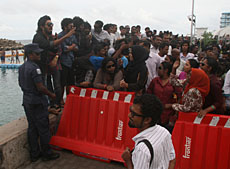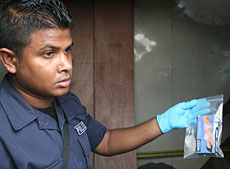Independent institutions play a pivotal role in a democracy. Their independence from political influences is one of the key reasons such institutions remain a vital part of democracy and a functional mechanism for check and balances of a democratic system.
One such institution established by the Maldivian constitution was the Human Rights Commission of the Maldives (HRCM). An institution set up under the article 189 of the constitution to ensure that the Maldives has made the much needed necessary transition from the days of police brutality and human rights violations during the ‘Gayoom era’ to the present day, and to protect and uphold the values of human rights of all citizens.
But the tale seems to be going in the wrong way. It is going to be almost four months after the country’s first democratically elected president was ousted in what was an obvious coup d’etat. It is going to be four months from the day where a few petty politicians, with the financial backing of a few self-centered business tycoons and mendacious preachings of deceitful sheikhs, led to disillusioned patriots within the security forces make an absolute mockery of the people’s rule.
With the coup came not only a change of a regime, but a return to the nightmares of Gayoom’s 30 year long dictatorship that the Maldivians never ever wanted to see again. Nepotism has come back in full swing. Police brutality once again has become abundant. Reports of human rights violations are slowly re-surfacing.
On February 6, the night before Nasheed was forced out of office, a police platoon broke the chain of command and came storming into the Maldivian Democratic Party (MDP) ‘Haruge’ and ran riot in the premises, beating down anyone that unfortunately came into their way – a direct violation of the article 246 of the Constitution of the Maldives. The HRCM failed to come up with anything substantial.
On February 8, the day after the toppling of Nasheed’s administration, the ousted president and senior officials of his administration and several MPs, along thousands of citizens who were convinced that their vote had been ‘robbed’ by ousting their elected leader, took to the streets exercising the constitutional rights of freedom of expression and freedom assembly entitled in the articles 27 and 32.
The protesters were met with one of the most violent crackdowns in the history of the country. But the HRCM merely concluded with a condemnation statement and the publishing of a report.
But alas, they found it an utmost priority to investigate the matter of the arresting of the chief Judge of the Criminal Court, the notorious man who is the root of the problems of our crippled judiciary. Yes, I do not disagree that arresting of a Judge was indeed a controversial move, given how flawed the check and balance mechanism is in our system is.
But when one protecting a notorious Judge with a history of ‘bending justice’ for his own personal interest becomes more of a priority than to looking into the human rights violations of hundreds of ordinary people beaten down ruthlessly by the police and the military, who were supposed to serve and protect them?
On March 6, a country that boasts of working to empower and uphold the rights of women and advocate against gender disparity, suddenly forgot what they had been preaching, and found the respect and dignity of the women they advocated for blasted by saltwater cannons. A group of female protesters went to the president’s office with an innocent intention of delivering a petition to the regime leader. Despite having a female in the presidency of HRCM, what a shame it was when it barely made a move. Where were the rights of women that day?
On May 29, another wave of police brutality struck again, as the coup regime’s unprecedented sudden nightmares over a ‘cursed rooster’ lead to police sieging into the MDP protest camp at ‘Usfasgandu’ under the excuse of alleged practice of black magic and sorcery, only to find no substantial evidence that gave rise to any criminal activities going on in the camp.
Furious protesters again began protesting in front of the barricades and yet again the police barged into the crowds with batons and pepper spray, beat down protesters and even pepper sprayed a cameramen of a local TV station who had tried to film the violent arrests.
But it seemed that the officials of HRCM present during the police takeover of the camp were either not in sane mind, or blinded and deafened as the commission issued a statement applauding the actions of police for their ‘professional handling’ the situation. What a fantastic way to mock the people again as the video footages revealed the extent of barbarity of the police. When did violent brutality become professionalism?
The Human Rights Commission is bitterly failing. They are far behind in following up with the police brutality and human rights violations of the coup regime. They have become a deaf and blind toady of Gayoom, Waheed and the senior officials of the coup regime instead of being the lions of the throne. They ought to have been defending and upholding the rights and liberties of the Maldivian constitution. Indeed a disheartening story to tell.
All comment pieces are the sole view of the author and do not reflect the editorial policy of Minivan News. If you would like to write an opinion piece, please send proposals to [email protected]


